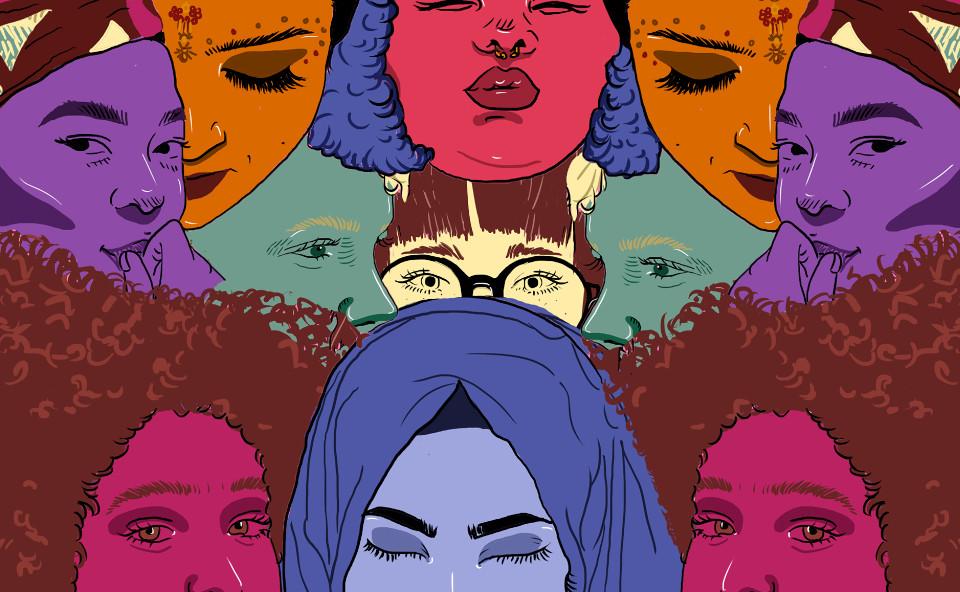
We are sitting in her kitchen as she mixes ingredients for the dumplings we will soon fill, then pinch together to seal at their tops, and steam. As the mix of vegetables reaches full cooking point, she takes the handle of the heavy saucepan by both hands and begins to toss its contents expertly. The face she makes – a mix between a scowl and deep concentration – is one I recognise easily from watching my mother cook.
As she tells me more about the history and culture of Nepal, I find my deficient knowledge about this place embarrassing. She tells me about how Dalits are mistreated within her context, and I marvel at the fact that while I have heard much about the caste system in India, I have never really thought about how it extends to other nations within South Asia. It is the same feeling of embarrassment I have when a Bangladeshi friend explains the links between the Bangla language and Bengali.
Why should I feel embarrassed, you might ask.
Knowing a fair amount about South Asia from India, it’s the same embarrassment I feel about knowing some other regions of the world almost exclusively from one country. It is the embarrassment I feel about the ignorance I still hold about parts of this geopolitical and ideological space we like to refer to as "the global South".
Feminist framings of "the global south"
For some time now, I have been quite frustrated by the way feminist activism frames "the global South" in often homogenising ways. If one imagines the sheer geographical size of this space – which includes Latin America, Africa and most parts of Asia – it becomes self-evident that collapsing the experiences of peoples of such a diverse range of oppressions and actions against them inevitably leads to significant forms of erasure.
For some time now, I have been quite frustrated by the way feminist activism frames "the global South" in often homogenising ways.
I recall once sitting in a global feminist meeting and feeling a deep sense of disembodiment because of this. While I am highly privileged to be exposed to different cultural spaces, I could still see and feel the very obvious exclusions that were being perpetuated. Framed as a meeting of the "the global South", the focus was heavily on South and Southeast Asian, Middle Eastern and Latin American feminist interventions. And so too was the theoretical underpinning. One day during a tea break, a participant from rural Malawi with limited English-speaking capacity came up to me and asked me if she was stupid (her word) because she couldn’t fully grasp the often inaccessible and academic language that facilitators were using during the proceedings of the meeting. I reassured her that she was not stupid. At another point, a Kenyan participant confessed they’d entirely zoned out because the content – and the facilitation team – didn’t reflect Black Africa.
There is little as dehumanising as travelling thousands of kilometres to be in solidarity with others, only to realise that this solidarity largely entails your erasure.
I’ve seen this scenario play out repeatedly; a scenario in which little or no space is created to listen to sub-Saharan African interventions (apart from South Africa sometimes), or even put them on the agenda. As a result, participation of those from this region is largely passive. And as a deeper result, there is the (re)internalisation that issues from these places do not matter.
Totalising narratives and passive solidarity
While I do agree that intersectionality is essential, and that listening to other contexts matters, I challenge the idea of passive Black African solidarity. I also challenge the idea of "the global South" as a homogenous space. As a Zimbabwean, I am acutely aware of how online feminist interventions that work in South Africa (with which my country shares a border) are often not translatable to our local context. This difference is informed by a diverse range of factors including histories, differing feminist traditions, economies, race relations and levels of online access. If this holds true for two nations within the same geographic context (southern Africa), how much more pronounced does this become when we move to east and west Africa, and beyond?
When the 2011 uprisings in North Africa and the Middle East began, I happened to be doing my Masters’ degree in the United Kingdom. One day, one of our lecturers asked our diverse class whether we could see the "Arab Spring" being replicated in different parts of Africa. Coming from countries including Nigeria, Ghana, Rwanda, Kenya, Zambia and Angola, we all felt strongly that the culture of protest in North Africa was markedly different to that of our own countries. A dynamic conversation in which a Yemeni classmate offered some pertinent insights into Middle Eastern culture ensued. Our class unfortunately did not have any North African students.
Coming from countries including Nigeria, Ghana, Rwanda, Kenya, Zambia and Angola, we all felt strongly that the culture of protest in North Africa was markedly different to that of our own countries.
From time to time, I reflect on that class discussion. As time would prove, the uprisings did not filter down into the rest of Africa, and having a space to reflect on that gave us insights about each other’s countries, and our own. It also reinforced my aversion towards totalising narratives.
It isn’t news that certain regions of "the global South" are given more leverage than others. And it also isn’t news that within these regions, there is often a more popular or prominent nation(s). As such, a lot of feminist funding plays to those notions; one sees it in how many grants limit eligibility for application to countries that are already inundated with interventions and/or linked to certain geopolitical ideologies.
But one also sees it in how feminist programmers sometimes exhibit resistance to branching out beyond those focal spaces. Here, I recall an unsuccessful exchange with a non-African manager to try to convince them to focus funding on an east African digital activism grant in Uganda, rather than Kenya. My logic was that with Kenya being the prominent country in that region already, it would be good to give another country some funding. While I understood that Kenya would make for significantly easier programming due to a range of contacts there, I questioned what this really meant in terms of long-term outlook beyond easily accessible spaces.
It is this dominance that feminist organising seeks to dismantle, but which it at times reinforces by (re)creating hegemonic powers of "the global South".
I am highly aware that feminist funding remains precarious and that feminist organisations are constantly trapped in a cycle of trying to do much with limited resources. But part of the work of feminism is to be transformative; and to be transformative in the allocation of those limited resources. Where that is not possible, it is crucial to not make tokenistic and traumatising gestures.
... part of the work of feminism is to be transformative
Representation matters. We had that important lesson reiterated in June with the global resurgence of the #BlackLivesMatter movement. In that moment, many Black feminists publicly shared their feelings of isolation and othering, even within global women’s rights organisations that pride themselves on their intersectionality. What those narratives amplified was the continuing resistance to radical and structural change of many feminist organisations and spaces. What they have showed are the traumas that many, already living within multiple erasures, are continuously being exposed to.
If you don’t intend your feminism to be transformative, then please at least spare us this dehumanising agony.
- 9291 views






Add new comment